How to Help Clients Training for a Marathon (Free Guide)
Developing the skills to train clients for a marathon can open up a new avenue for your personal training business. It’s crucial, however, to have the appropriate knowledge and tools to train these clients effectively. Utilizing specific features of personal training software can greatly assist in this goal. Learn how to guide clients training for a marathon and the top personal trainer business tools you’ll need in this detailed guide.
- Assisting clients in marathon training requires a systematic approach, integrating endurance workouts, strength training, flexibility exercises, and proper recovery protocols.
- Most marathon training clients will need a progressive running plan that gradually increases their mileage, while also incorporating cross-training to avoid overuse injuries and maintain overall fitness.
- The use of workout and assessment software can help in tracking progress, scheduling workouts, and managing recovery, ensuring your clients reach their marathon goals safely and effectively.
Helping clients prepare for a marathon can provide personal trainers a rewarding way to make a substantial difference in their clients’ fitness journeys.
To help clients training for a marathon effectively, you need not only an understanding of endurance training but also the necessary tools to monitor progress and adjust training plans; that’s where personal training software steps in. By taking advantage of the features that top-quality software for personal trainers has to offer, you can guide clients in their marathon training in a way that maximizes their performance and minimizes injury risk.
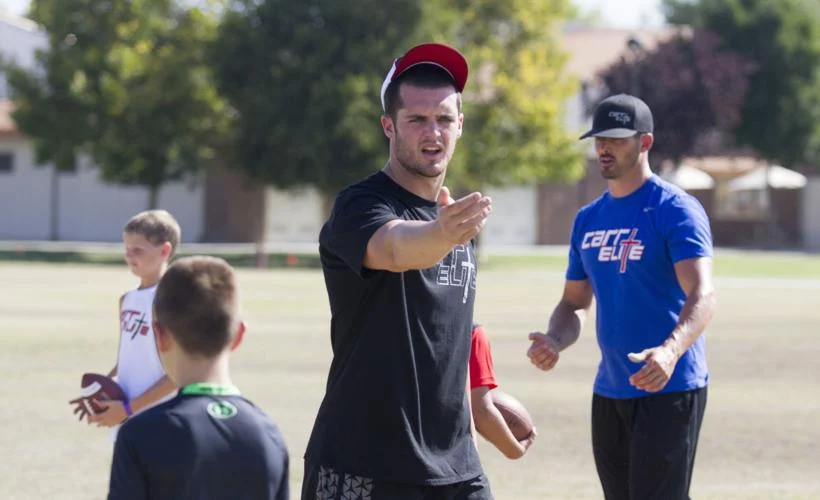
To get the best personal training software from Exercise.com, book a demo now!
The Benefits of Hiring a Personal Trainer for Marathon Training
In recent years, marathons have gained immense popularity as individuals strive to push their physical and mental limits. For many people, completing a marathon is a significant achievement and a testament to their dedication and perseverance. However, training for a marathon can be a daunting task, requiring a comprehensive plan and individualized guidance. As a personal trainer, you play a crucial role in helping your clients navigate the complexities of marathon training, ensuring they stay motivated, injury-free, and ultimately achieve their goals.
When it comes to marathon training, the benefits of hiring a personal trainer cannot be overstated. A knowledgeable and experienced personal trainer brings a wealth of expertise to the table, enabling them to design a training plan tailored to the unique needs and abilities of their clients. They can provide guidance on proper running techniques, monitor progress, offer support and motivation, as well as make adjustments to the training plan as needed. By working with a personal trainer, clients can maximize their training efforts and minimize the risk of injuries, ultimately increasing their chances of success on race day.
In addition to the personalized training plan and guidance, hiring a personal trainer for marathon training also offers the advantage of accountability. Having a scheduled training session with a trainer creates a sense of commitment and responsibility, making it less likely for clients to skip workouts or slack off. The trainer serves as a source of motivation and encouragement, pushing clients to stay on track and reach their goals. This level of accountability can be especially beneficial for individuals who struggle with self-discipline or find it challenging to stay motivated on their own.
Setting Realistic Goals for Marathon Training
Setting realistic goals is essential in marathon training. It is crucial for personal trainers to work closely with their clients in establishing achievable objectives that are based on factors such as fitness level, previous running experience, and race-specific conditions. By setting realistic goals, clients can avoid frustration and maintain a positive mindset throughout their training journey. Personal trainers can also help clients break their overall goal into smaller milestones, providing a sense of accomplishment along the way and boosting motivation.
One important aspect of setting realistic goals for marathon training is considering the time available for training. It is essential for personal trainers to assess their clients’ schedules and commitments to determine how much time they can dedicate to training each week. By taking into account factors such as work, family, and other responsibilities, trainers can help clients establish a training plan that is feasible and fits into their lifestyle.
In addition to considering time constraints, personal trainers should also take into account the clients’ physical limitations and potential risk of injury. It is crucial to assess the clients’ current fitness level and any pre-existing conditions that may affect their training. By understanding these limitations, trainers can tailor the training program to ensure that it is safe and appropriate for the clients’ individual needs.
Assessing Clients’ Fitness Levels Before Starting Marathon Training
Prior to embarking on any marathon training program, it is crucial to assess your clients’ fitness levels comprehensively. This assessment should involve evaluating their cardiovascular endurance, muscular strength, flexibility, and overall health. By understanding your clients’ starting point, you can design a training plan that progressively challenges them while minimizing the risk of overexertion or injury. Regular reassessments throughout the training program allow you to track progress and make necessary adjustments to ensure optimal results.
One important aspect of assessing clients’ fitness levels is evaluating their cardiovascular endurance. This can be done through various tests, such as the 1-mile run or the beep test. These tests measure the clients’ ability to sustain physical activity over a prolonged period and provide valuable information about their aerobic capacity.
In addition to cardiovascular endurance, it is essential to assess clients’ muscular strength. This can be done through exercises like the bench press, squat, or deadlift. By evaluating their strength levels, you can determine if they have any muscle imbalances or weaknesses that need to be addressed in their training program.
Designing a Customized Training Plan for Marathon Preparation
Every client has unique needs, goals, and limitations when it comes to marathon training. As a personal trainer, it is your responsibility to design a customized training plan that takes into account factors such as clients’ current fitness level, available time for training, and individual preferences. A well-structured training plan should incorporate a balance of running workouts, strength training, cross-training activities, rest days, and recovery periods. By tailoring the plan to the specific needs of your clients, you can help them train safely, efficiently, and effectively.
The Importance of Proper Nutrition for Marathon Training
Proper nutrition plays a vital role in marathon training. As a personal trainer, you should educate your clients about the significance of consuming a well-balanced diet that provides an adequate amount of macronutrients (carbohydrates, proteins, and fats), micronutrients (vitamins and minerals), and hydration. A nutrient-rich diet fuels the body, supports muscle recovery, enhances performance, and helps prevent injuries. It is essential to work with your clients to develop a nutrition plan that meets their specific needs and supports their training demands.
Incorporating Strength and Cross-Training into Marathon Workouts
A well-rounded marathon training program should go beyond running alone. To maximize performance and reduce the risk of injuries, it is crucial to incorporate strength training and cross-training activities into the workouts. Strength training helps build muscular strength and endurance, improves running economy, and enhances overall stability. Cross-training activities such as swimming, cycling, or low-impact exercises can provide the necessary cardiovascular benefits without placing excessive stress on the joints. By including these components in the training plan, you can help your clients develop a strong and resilient body capable of tackling the demands of a marathon.
Preventing Common Injuries in Marathon Training
Preventing injuries is a key aspect of marathon training. As a personal trainer, you should educate your clients on common running-related injuries and implement strategies to minimize their occurrence. This includes emphasizing the importance of proper warm-up and cool-down routines, incorporating dynamic stretches, recommending appropriate footwear, and encouraging regular rest and recovery days. Additionally, teaching clients to listen to their bodies and recognize the early signs of injury allows for prompt intervention, reducing the likelihood of more severe problems. By prioritizing injury prevention, you can help your clients stay on track with their training and cross that finish line successfully.
Tips for Building Endurance and Stamina during Marathon Training
Building endurance and stamina is crucial for marathon training. Help your clients develop endurance by gradually increasing the duration and intensity of their runs over time. Incorporating long runs, tempo runs, and interval training into their program are effective ways to improve cardiovascular fitness and running efficiency. Encourage your clients to listen to their bodies and be patient with their progress, reminding them that building endurance takes time. By providing guidance and support, you can help your clients strengthen their bodies and minds, preparing them for the physical and mental challenges of a marathon.
Mental Preparation Strategies for Successful Marathon Completion
Mental preparation is just as important as physical training when it comes to marathon completion. Help your clients develop effective mental strategies to overcome self-doubt, stay focused, and maintain a positive mindset throughout their training and on race day. Techniques such as visualization, positive self-talk, goal-setting, and mindfulness can aid in managing anxiety and enhancing motivation. Encouraging your clients to engage in mental training regularly and build resilience ultimately contributes to their success in completing a marathon.
Staying Motivated and Overcoming Challenges in Marathon Training
Marathon training can be a grueling process, with various challenges that might test your clients’ motivation and dedication. As a personal trainer, it is important to understand the unique obstacles your clients may face and help them overcome these hurdles. This can include creating a supportive environment, providing regular encouragement, celebrating milestones, and instilling a sense of achievement. Remind your clients of their progress and the reasons why they embarked on this journey in the first place. By being a source of motivation and support, you can help your clients stay on track and maintain their enthusiasm throughout the training process.
Strategies for Effective Recovery and Rest in Marathon Training
Recovery and rest are indispensable components of marathon training. As a personal trainer, it is important to educate your clients about the significance of proper recovery to allow their bodies to adapt and heal. Encourage them to prioritize quality sleep, incorporate active recovery exercises, and practice relaxation techniques. Remind your clients that rest days are not a sign of weakness but rather crucial for preventing overtraining and enhancing performance. By emphasizing the importance of recovery and rest, you can help your clients achieve a balance between training and allowing their bodies to rejuvenate for optimal results.
Monitoring Progress and Making Adjustments in Marathon Training Plans
Monitoring progress and making adjustments are key to ensuring the success of your clients’ marathon training. Regularly assess your clients’ performance, track their running times, endurance levels, and overall well-being. By keeping an eye on their progression, you can identify areas that require improvement or adjust the training plan to address individual needs or circumstances. Regular communication with your clients is paramount to understanding how they are feeling physically and emotionally. Collecting feedback and addressing their concerns in a timely manner allows you to customize their training experience, fostering long-term success.
Preparing Clients for Race Day: What to Expect on the Big Day
Preparing clients for race day is vital to ensuring a smooth and enjoyable experience. Provide them with a comprehensive understanding of what to expect, from pre-race rituals to the logistics of the event itself. Educate them on proper pacing strategies, fueling and hydration techniques during the race, and mental techniques to stay motivated when encountering challenges. By preparing your clients mentally and physically for race day, they can approach the marathon with confidence and a sense of readiness.
Strategies for Fueling and Hydrating during a Marathon
Fueling and hydrating properly during a marathon is essential for maintaining energy levels and preventing dehydration. Teach your clients about the importance of consuming carbohydrates before, during, and after their race to replenish glycogen stores. Guide them on the types and timing of fuel they should consume during the race, such as energy gels, sports drinks, or whole foods. Additionally, emphasize the need for proper hydration and remind them to listen to their bodies to prevent over hydration or dehydration. By educating your clients on effective fueling and hydration strategies, you can help them sustain their energy and perform at their best during the marathon.
Post-Marathon Recovery: How to Help Clients Bounce Back After the Race
Post-marathon recovery is a critical phase that requires proper attention and care. Help your clients navigate the period following their race by providing guidance on active recovery exercises, rest, nutrition, and sleep. Encourage them to listen to their bodies and gradually reintroduce physical activity. Assist them in setting new goals and planning their next steps in their fitness journey. By supporting your clients during their recovery, you can help them bounce back effectively, celebrate their achievements, and maintain their long-term commitment to a healthy lifestyle.
Reviewing Post-Marathon Performance: Celebrating Achievements and Identifying Areas of Improvement
After completing a marathon, it is essential to review and reflect on the overall performance. Meet with your clients to discuss their achievements, highlight the progress they have made, and celebrate their success. Additionally, identify areas for improvement that can be addressed in future training programs. This review allows your clients to acknowledge their dedication, appreciate their accomplishments, and identify new goals to further enhance their marathon experiences. By providing feedback and guidance, you can help your clients continue to grow and excel in their fitness journey beyond the marathon finish line.
Training for a marathon is a multifaceted endeavor that requires careful planning, individualized guidance, and unwavering dedication. As a personal trainer, you have the opportunity to play a pivotal role in assisting your clients throughout their marathon training journey. By employing comprehensive training plans, personalized strategies, and continuous support, you can help your clients achieve their goals, overcome challenges, and ultimately cross the finish line with confidence and pride. Together, you can turn their marathon dreams into a reality.
How do you support someone training for a marathon?
Supporting someone training for a marathon involves providing guidance, motivation, and practical assistance throughout their training journey. Encourage them to set realistic goals, create a structured training plan, and gradually increase their mileage. Offer advice on proper nutrition, hydration, and recovery strategies to optimize their performance and minimize the risk of injury. Provide emotional support, celebrate milestones, and help them stay motivated during challenging times. Offer to join them on training runs, provide feedback on their running form, and assist with logistics on race day. Being a reliable source of support and encouragement can make a significant difference in their marathon training experience.
What to consider when training for a marathon?
When training for a marathon, several key factors should be considered. First, gradually increase mileage and intensity to avoid overuse injuries and allow the body to adapt to the demands of long-distance running. Incorporate a mix of different types of runs, including long runs, tempo runs, speed workouts, and recovery runs. Prioritize proper nutrition, hydration, and sleep to support optimal performance and recovery. Consider cross-training activities to build overall strength and prevent muscle imbalances. Additionally, be mindful of the importance of rest and recovery days to prevent burnout and allow the body to repair and rebuild.
How do you motivate a marathon runner?
Motivating a marathon runner involves understanding their goals, providing encouragement, and helping them stay focused during training. Celebrate their accomplishments and progress, whether it’s completing a long run or achieving a new personal record. Remind them of their original motivation and why they embarked on the marathon journey. Offer positive reinforcement, remind them of their capabilities, and encourage them to overcome mental and physical challenges. Provide regular check-ins, share motivational quotes or stories, and create a supportive training environment. Additionally, help them maintain perspective, reminding them that progress is not always linear, and setbacks are normal and part of the journey.
What type of stretches should you do to train for a marathon?
When training for a marathon, it is important to include stretches that target the major muscle groups used in running. Focus on dynamic stretches before running to warm up the muscles and improve range of motion. Examples include leg swings, walking lunges, and high knees. After running, incorporate static stretches to improve flexibility and aid in muscle recovery. These stretches can include quadriceps stretches, hamstring stretches, calf stretches, and hip flexor stretches. It is also beneficial to include foam rolling or self-myofascial release exercises to relieve muscle tension and improve tissue quality.
What exercises should you do to train for a marathon?
In addition to running, incorporating cross-training exercises can be beneficial when training for a marathon. Strength training exercises that target the lower body, core, and upper body can help improve overall running performance and reduce the risk of injuries. Examples include squats, lunges, deadlifts, step-ups, planks, push-ups, and rows. Additionally, exercises that focus on stability, balance, and flexibility, such as yoga or Pilates, can enhance running efficiency and help prevent imbalances. It is important to strike a balance between running and cross-training to allow for proper recovery and prevent overtraining.
Should you do any weights to train for a marathon?
Including weight training in marathon training can have several benefits. Strength training exercises targeting the lower body can help improve muscular endurance and power, which can translate into improved running performance. Strength training can also help prevent muscle imbalances, stabilize joints, and reduce the risk of overuse injuries. Focus on exercises such as squats, lunges, deadlifts, and calf raises to target the major muscle groups used in running. Start with lighter weights and gradually increase the resistance as you build strength and endurance. It is important to work
with a qualified fitness professional to ensure proper form and technique when incorporating weights into your marathon training regimen.
How do you fuel leading up to a marathon?
Fueling properly leading up to a marathon is crucial for optimal performance and energy levels. Prioritize a well-balanced diet that includes carbohydrates, proteins, and healthy fats. Carbohydrates should make up a significant portion of your diet to provide glycogen stores for energy. Include whole grains, fruits, vegetables, and legumes as sources of carbohydrates. Incorporate lean proteins such as poultry, fish, beans, and tofu to support muscle repair and recovery. Include healthy fats from sources like nuts, seeds, avocados, and olive oil for sustained energy and overall health. Stay hydrated by consuming adequate fluids, especially during long runs. Experiment with different pre-race meals to find what works best for you, focusing on easily digestible foods that won’t cause gastrointestinal distress. Consulting with a registered dietitian who specializes in sports nutrition can provide personalized guidance based on your specific needs and goals.
Use the Best Personal Training Software to Offer a Stellar Client Experience
Training clients for a marathon requires a comprehensive and tailored approach. See how Exercise.com can help.
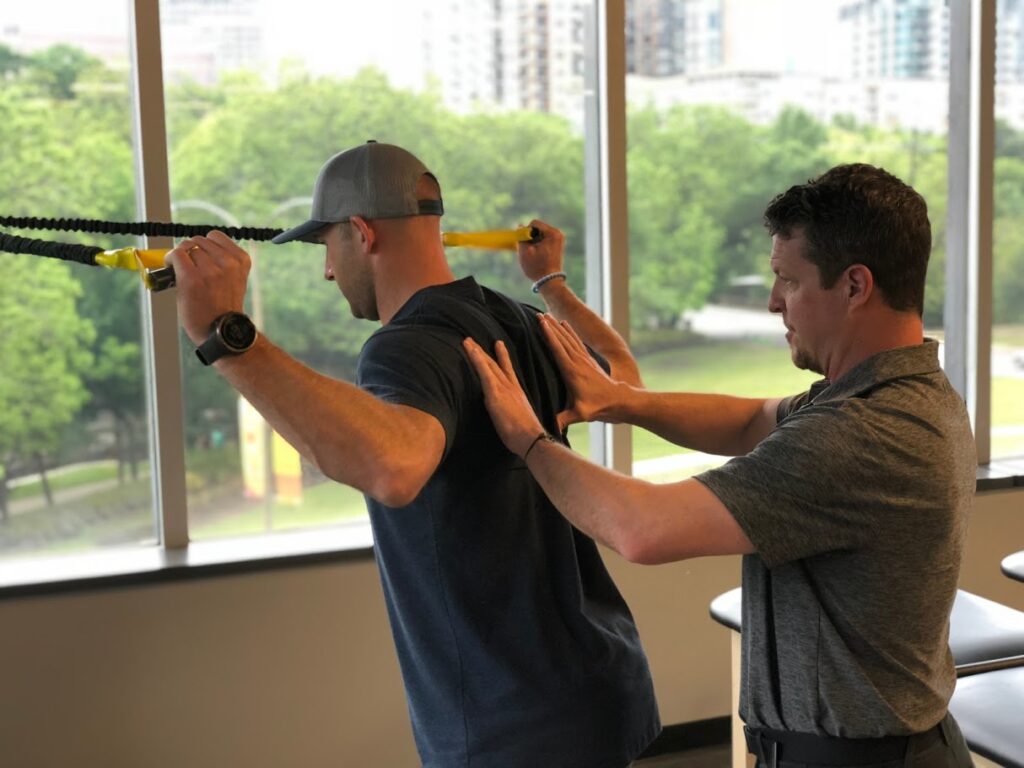
To learn more about how Exercise.com can help you run your fitness business, book a demo now!
Creating Training Plans for Clients Who Want to Run a Marathon
Here’s how you can help your clients accomplish their goals by using workout plan creator software to create workout plans, run fitness challenges, offer online workout groups, message clients, and more, all from your very own custom branded fitness apps.
Exercise.com stands out as an all-in-one fitness business management software with comprehensive workout plan sales capabilities. The robust member management, billing & invoicing, and unique fitness assessment tools offer a one-stop solution for fitness business needs. Here’s just some of what you can do with the Exercise.com platform:
Engage with clients via automations.
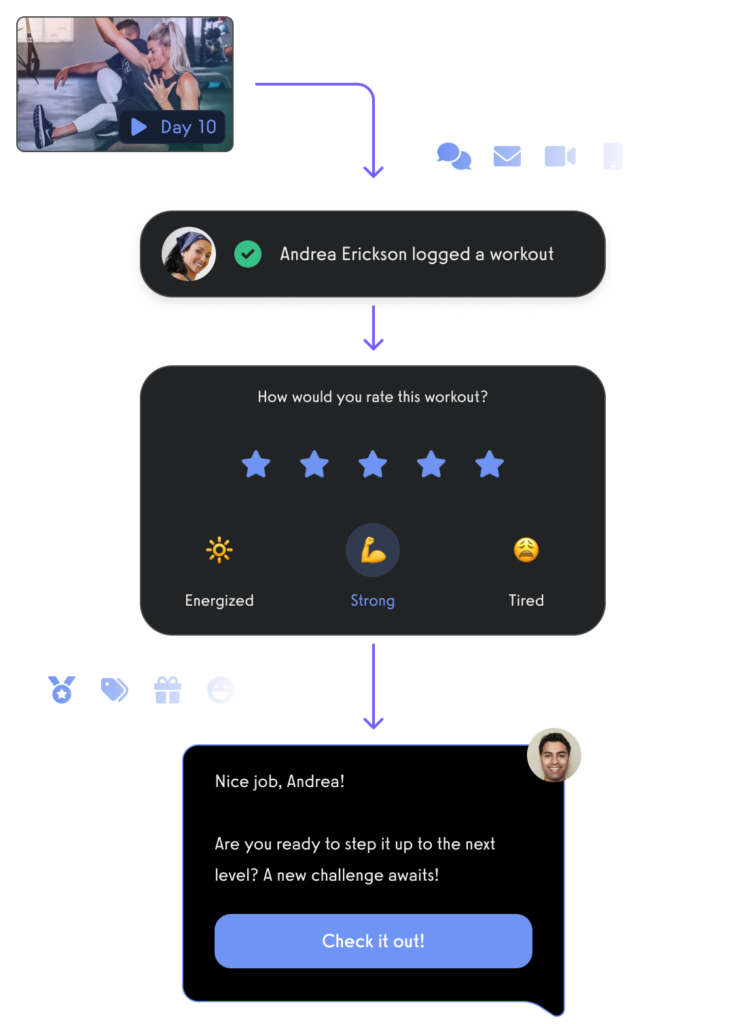
Manage leads with a fitness CRM.

Create and send fitness assessments with ease.
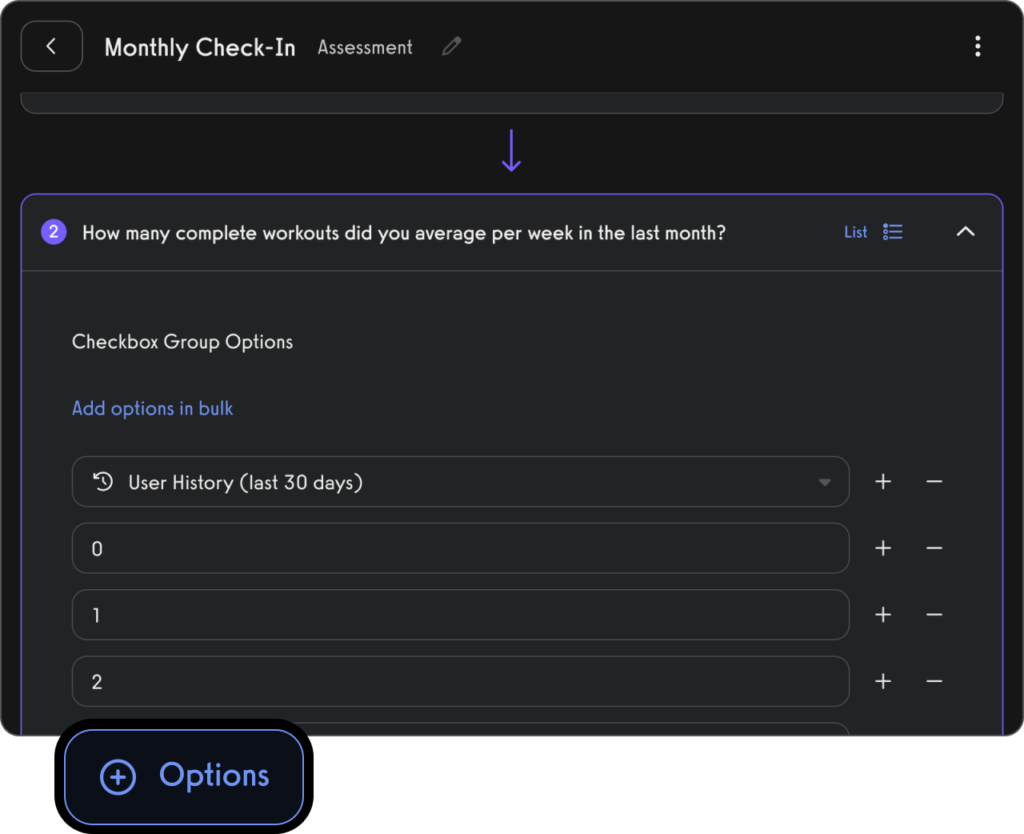
Use fitness habit tracking to inspire and motivate personal training clients (in-person and remote).
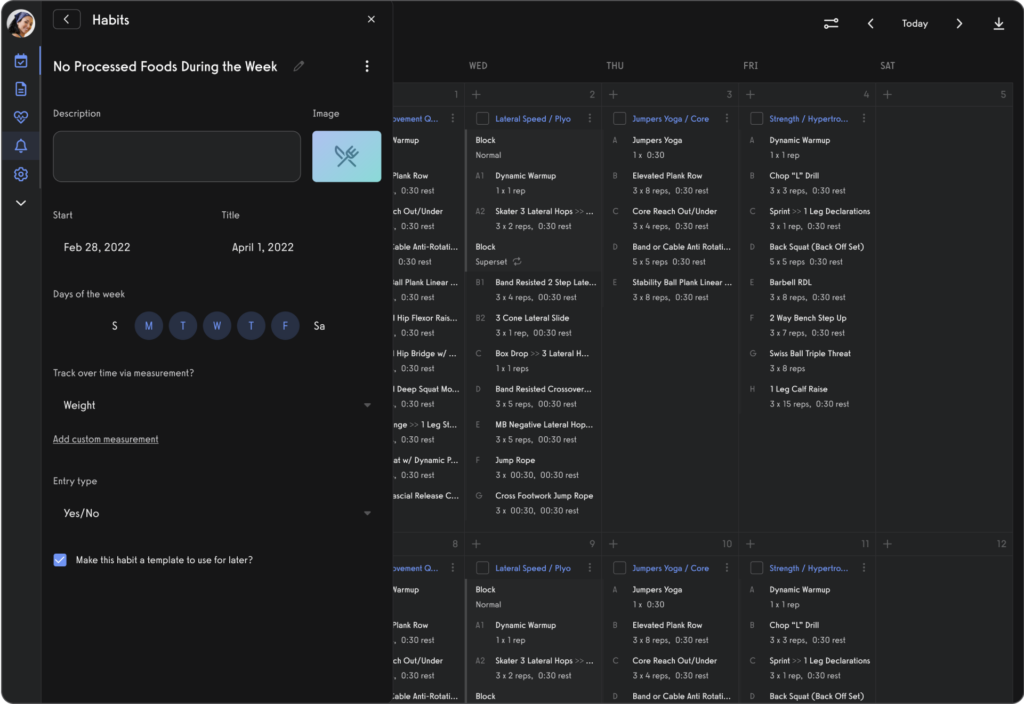
Use fitness progress photos to engage with clients.
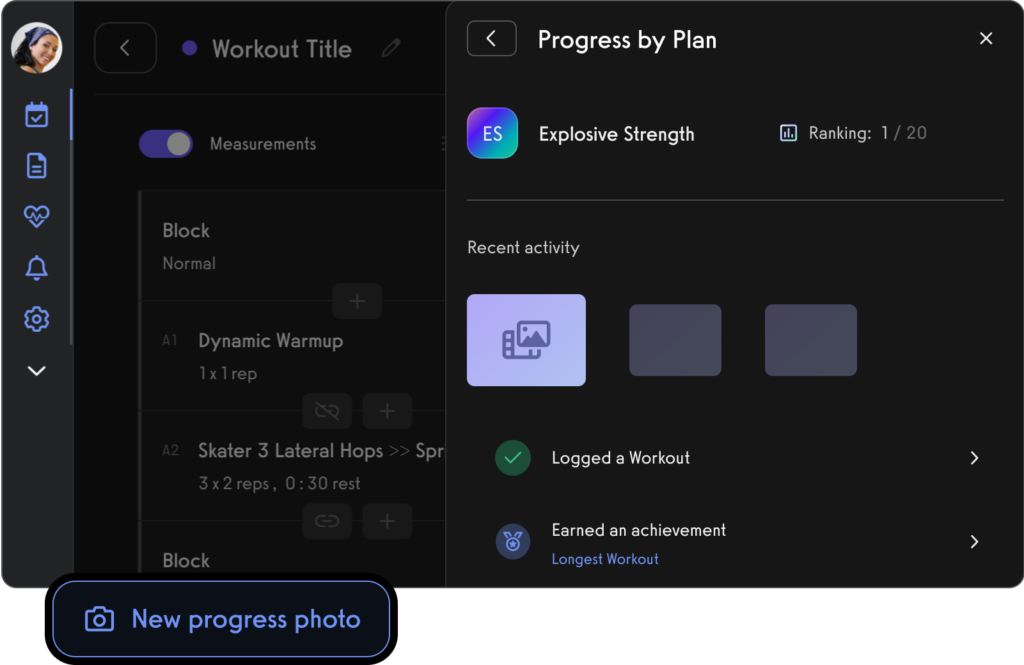
Use fitness leaderboards to track performance and inspire healthy competition.
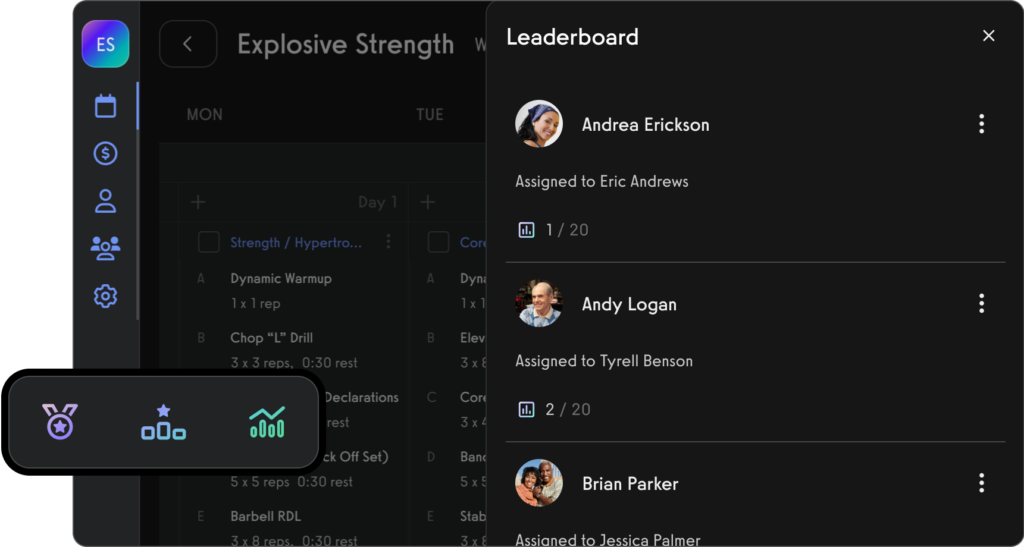
Use the exercise demonstration video library or create your own custom exercise demonstration videos.
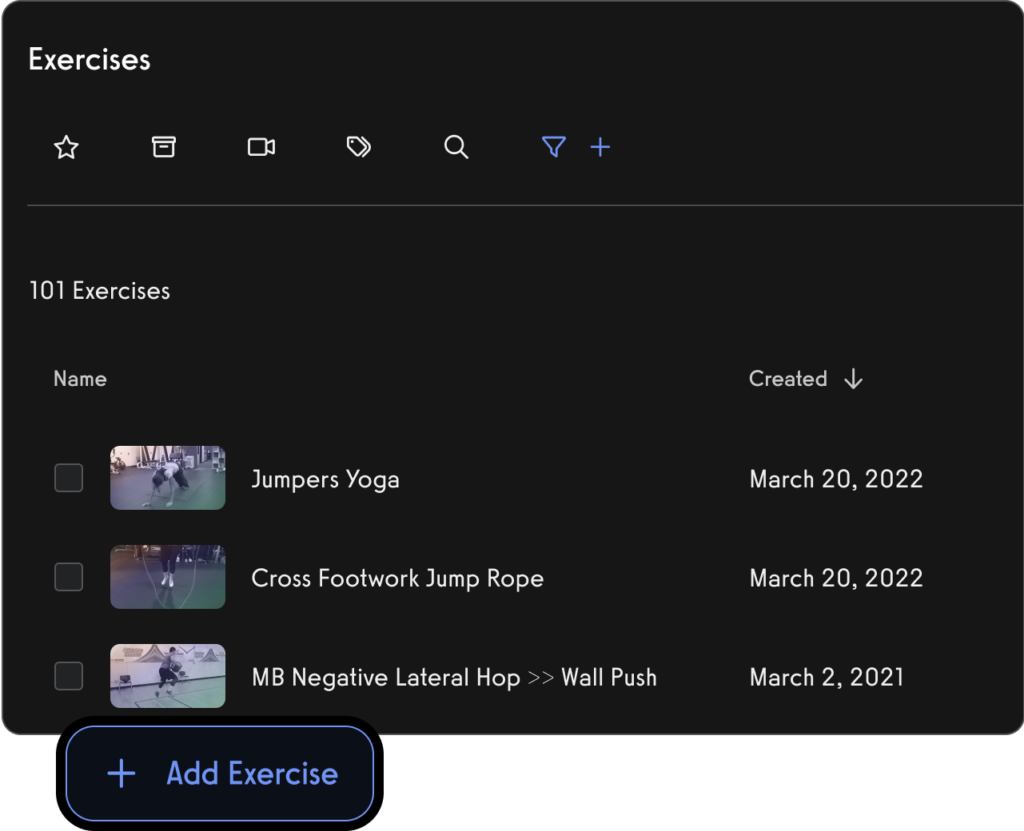
Create workout plans for parents and dependents, teams and more.
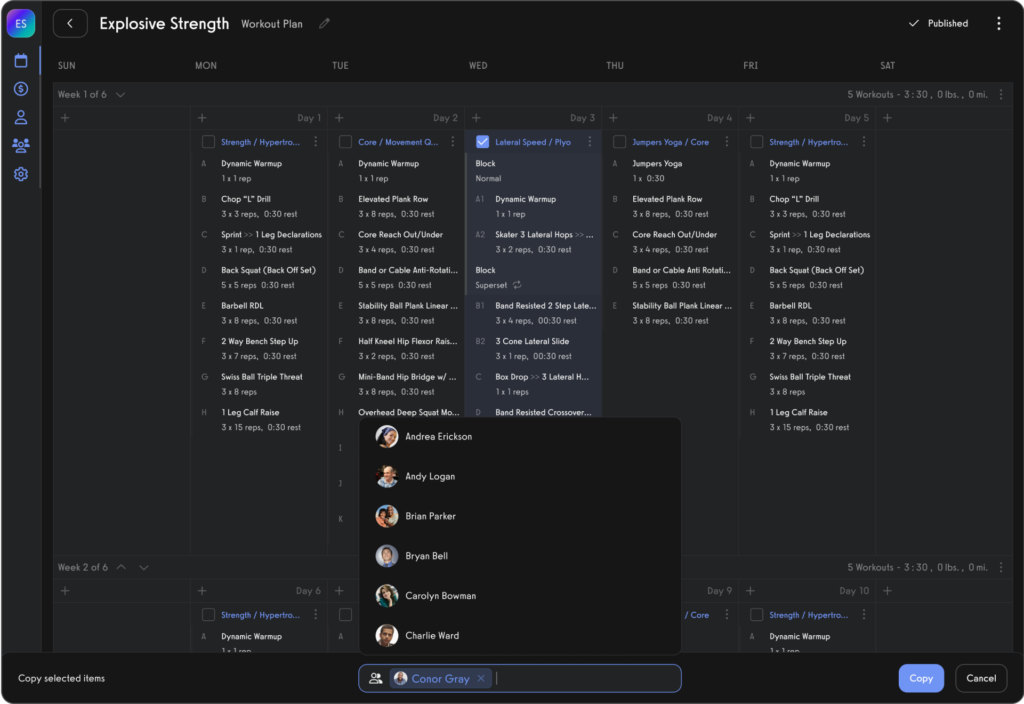
Manage personal training clients with ease.
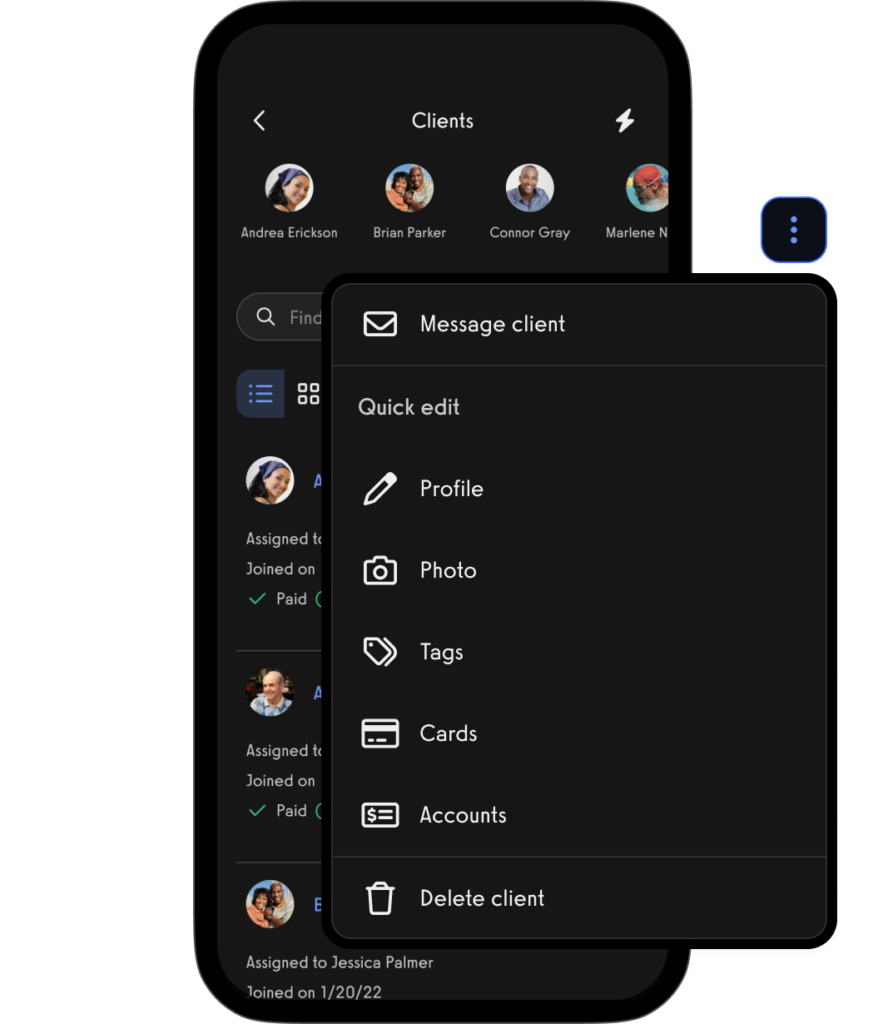
Book appointments for clients (Read More: Best Gym Booking Software)
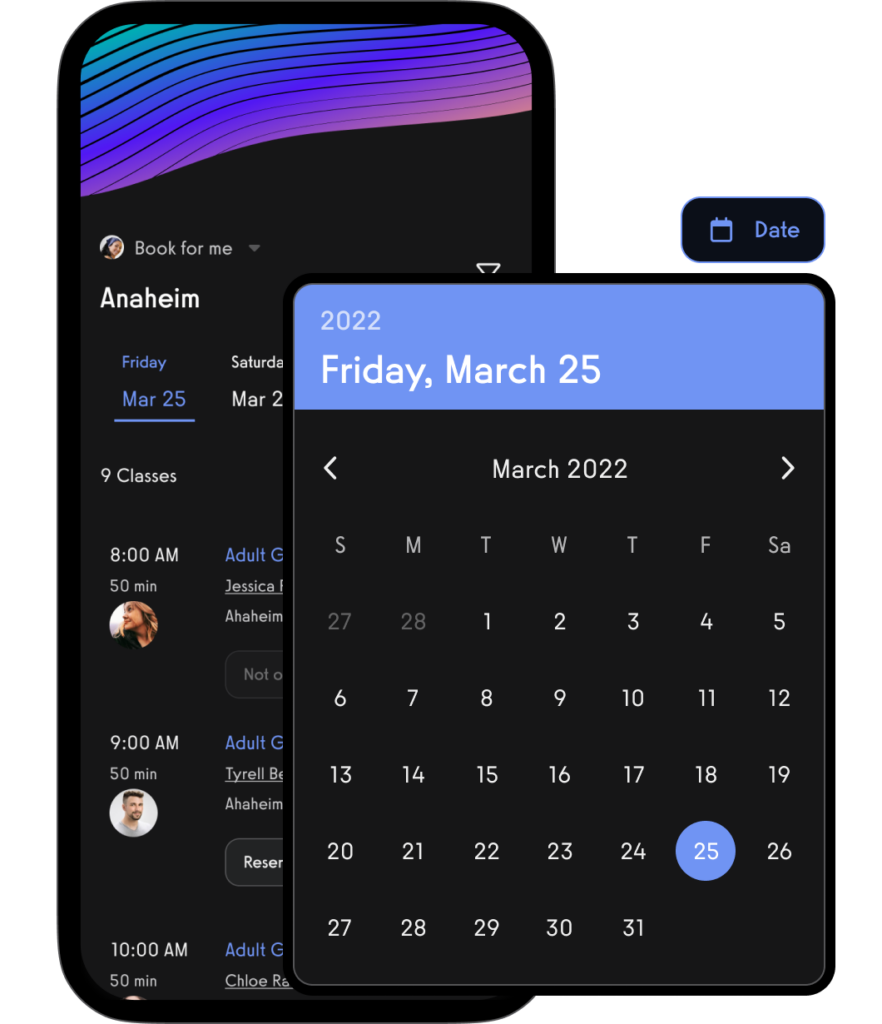
Create classes and fitness groups
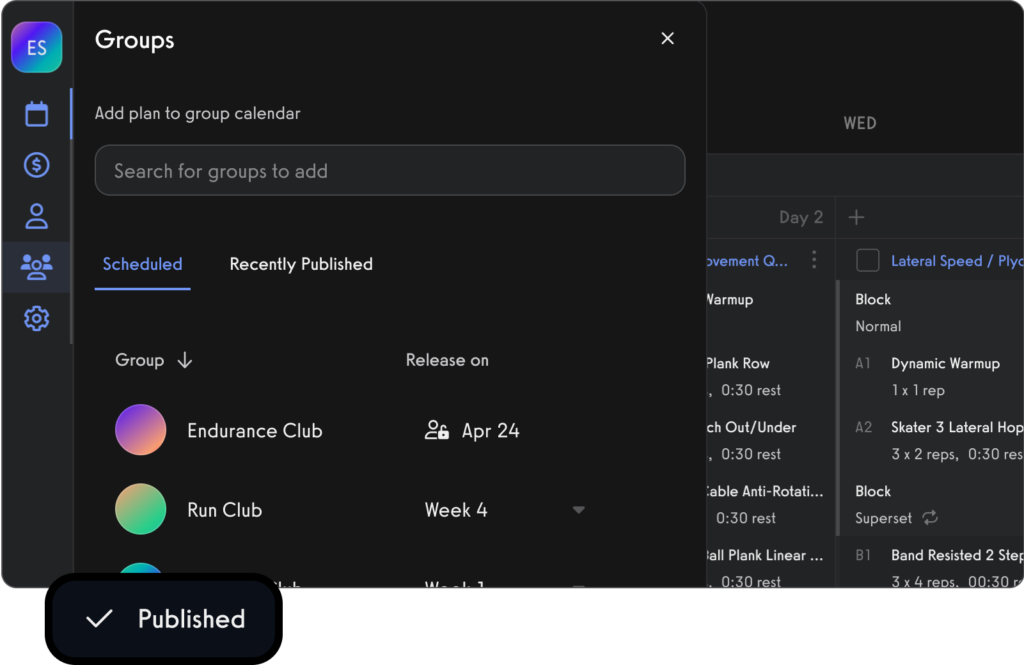
Manage fitness challenges (Read More: 100+ Fitness Challenge Ideas)
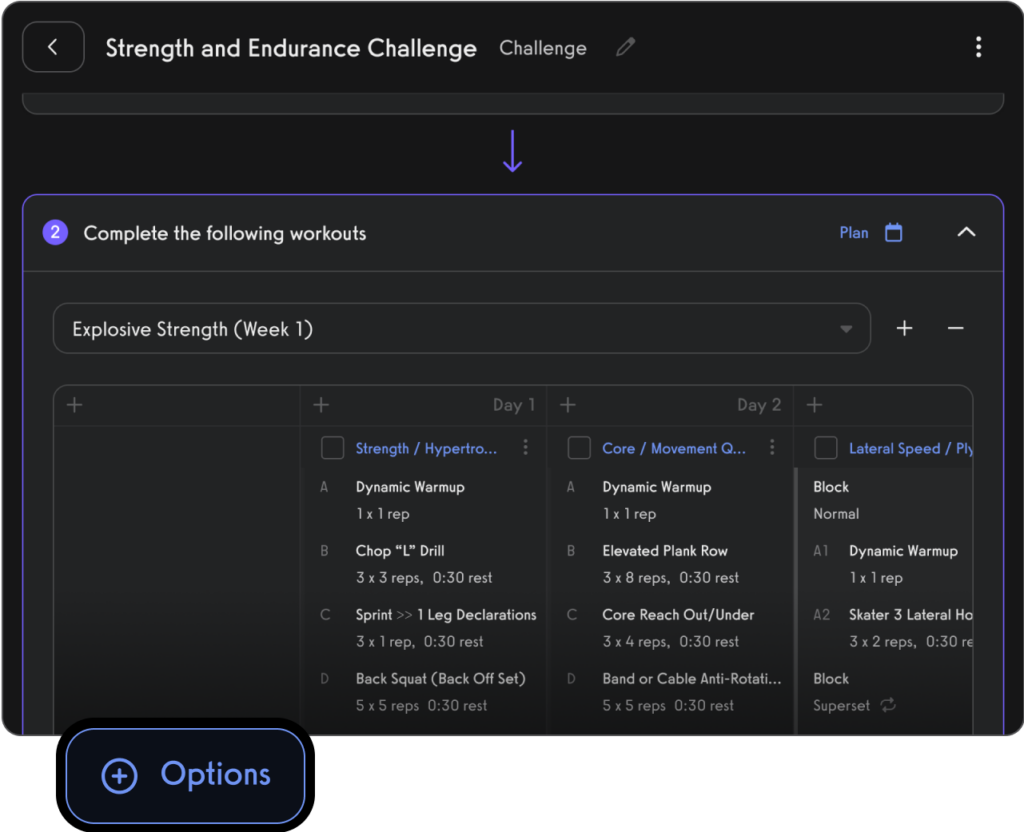
Process payments for open gym, classes, and personal training.

Communicate with gym members, athletes, team members, personal training clients, class members, parents, and dependents via SMS, email, and in-app push notification.
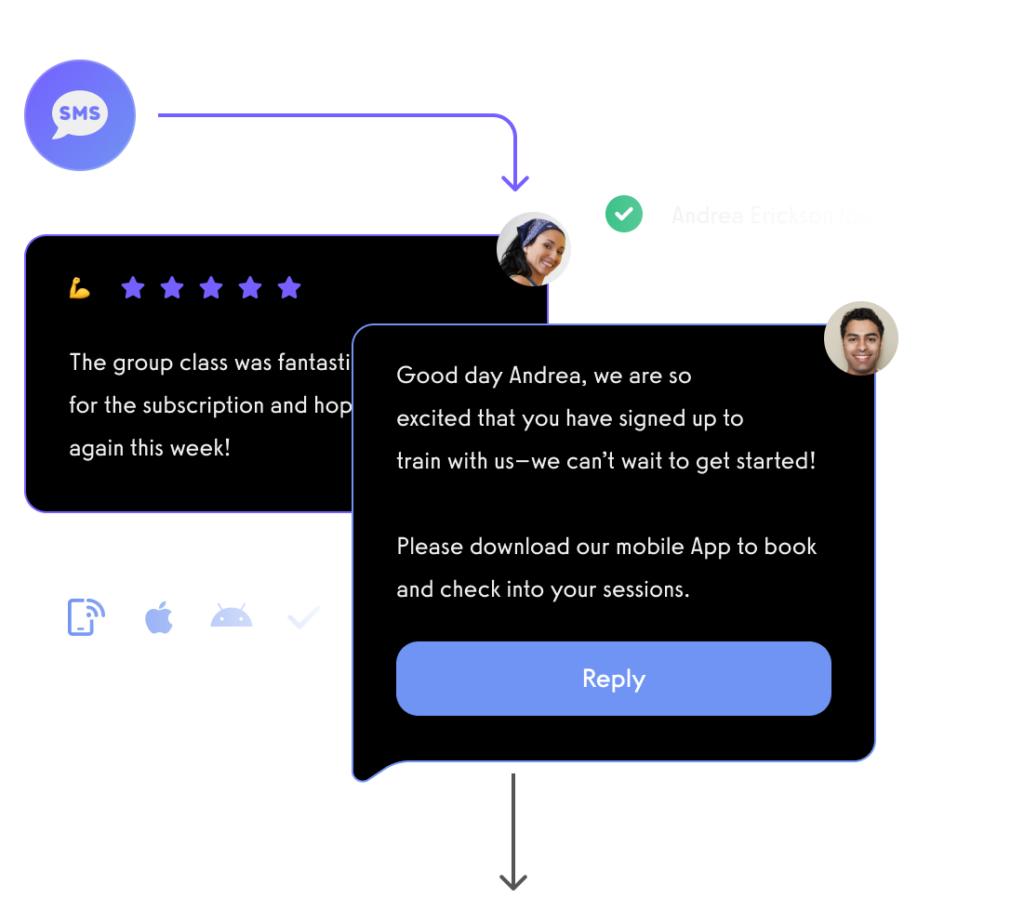
View performance over time, track personal records, and other fitness stats with performance reporting dashboards.
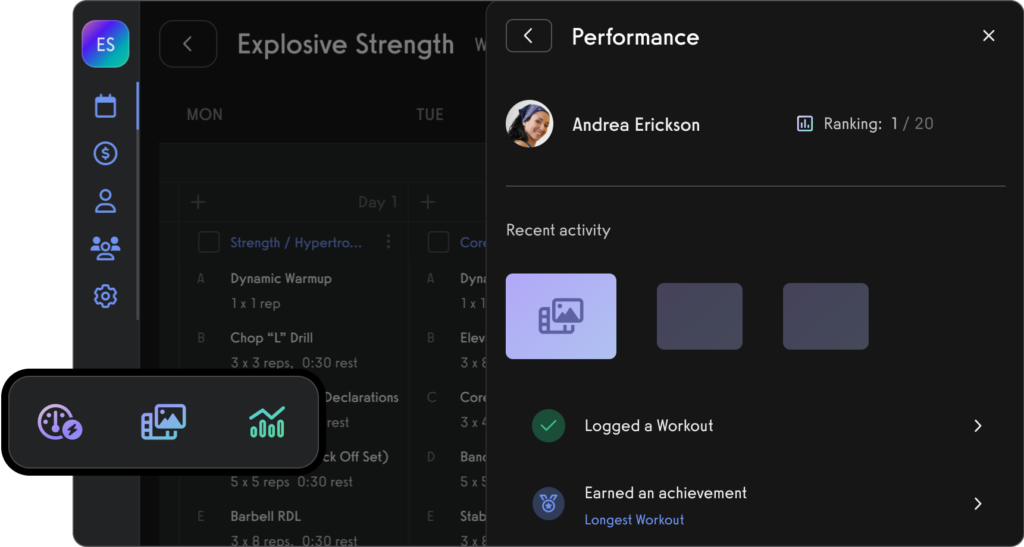
And of course, view all of your fitness business reports easily too.

All from your custom-branded fitness apps (Read More: Best Gym Mobile Fitness Apps Software)
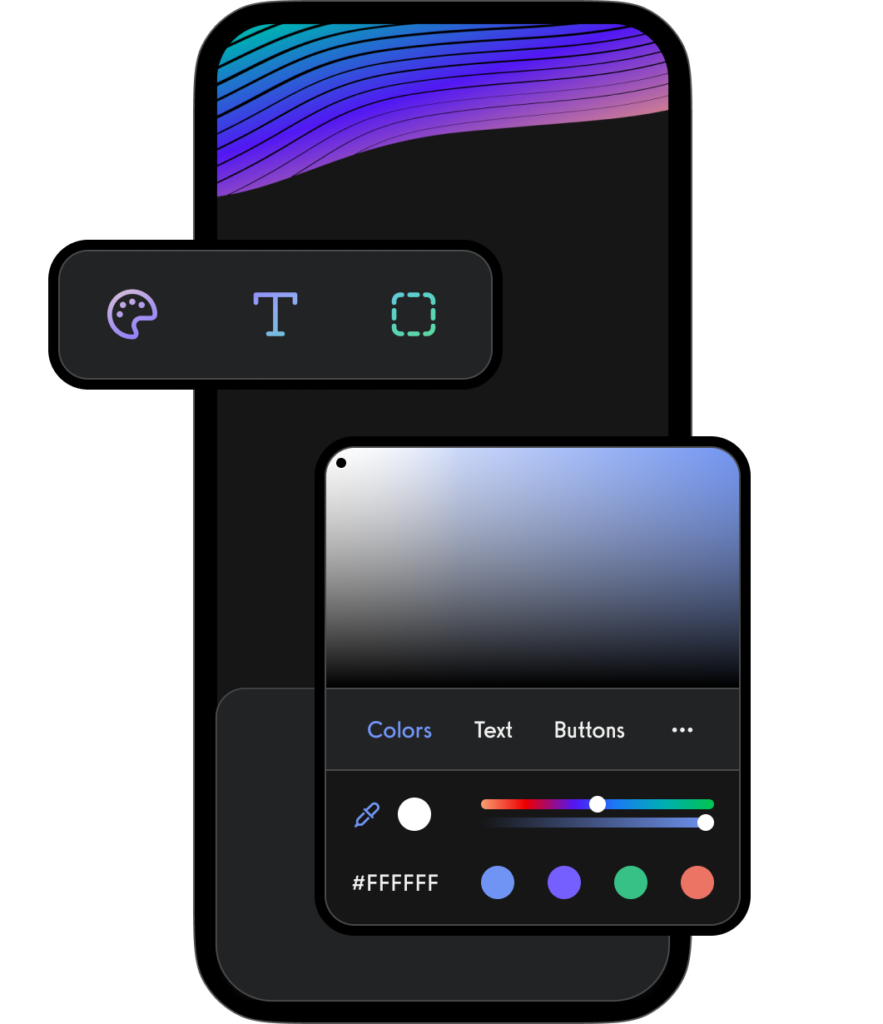
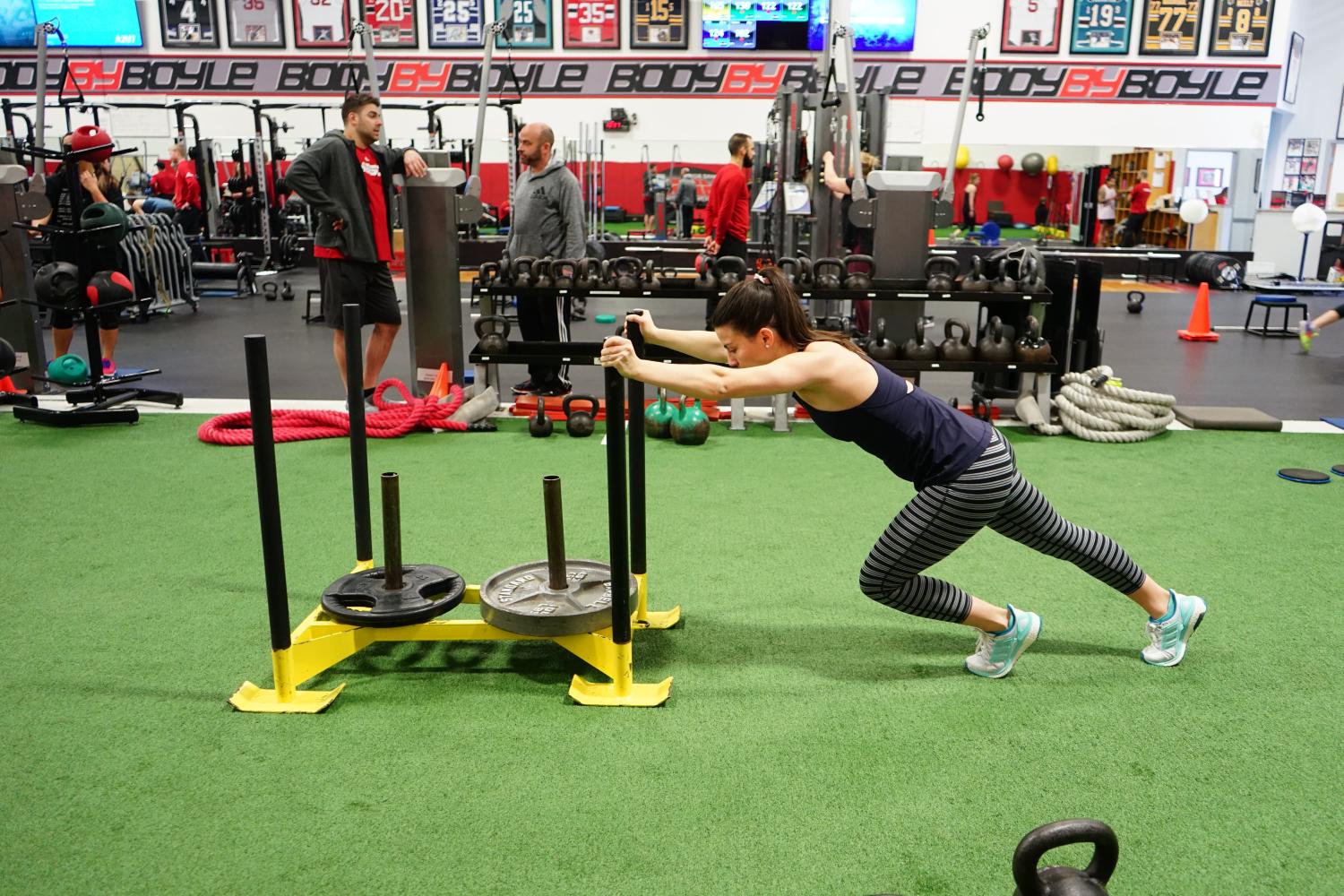
Want to learn how your fitness business can take it to the next level? Get a demo now!









